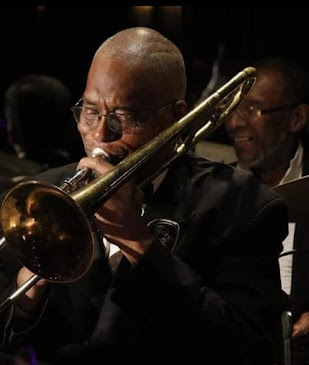The jazz world recently lost one of its most influential and ardent students of the music. Which is ironic because many have never heard of him. Unless, of course, you had the good fortune of crossing his path.
Tim Williams, affectionately known by his peers as “Bone,” was a St. Louis, Missouri, trombonist. Williams was a part of that wave of Berklee students who moved to New York in the 1980s and rattled the cage of the status quo. Dwayne "Cook" Broadnax, Greg Osby, Donald Harrison, Marvin “Smitty” Smith, Bruce “Bud” Revels, Terri Lynn Carrington, Jeff “Tain” Watts, and the person from whom I discovered Williams, Branford Marsalis.
In one of the many interviews Marsalis gave during the late eighties, he talked about his days at Berklee and how undisciplined he was when it came to practicing. Unlike Williams, a man who was no stranger to burning the midnight oil, Marsalis seemed to need occasional coaxing. Marsalis also talked about how Williams would knock on his door and insist that he follow him to the practice rooms down the hall. Branford obliged, of course. After all, Williams was a big guy with a low resonant voice and a gold cap on his front tooth that commanded much attention. He was like a teddy bear you knew would maul you if provoked.
This is who Tim Williams was. A person whose love for learning had no boundaries. The shed was his temple. His sanctuary. Music to him wasn’t just a vocation, a way to make money, an excellent way to get the girls. Music was the reason he woke up every morning. It was his spiritual lifeline. "Shedding" to him was the solution for many of life's problems.
I first met him during the early nineties when I was a member of Terence Blanchard’s quintet. Like many musicians during that time, Williams would come out regularly to hear us play. Remember, this was before social media. So, if you wanted to connect, Facebook, Twitter, and Instagram were not options; you had to physically leave your apartment and go to where the people were. For us, jazz clubs were our social platforms.
When I first met Williams, he wasn’t playing very much. In fact, I don’t think he had done anything newsworthy since his short stint with Art Blakey and the Jazz Messengers in 1985. Until he lost the trombone chair to Delfeayo Marsalis, Wynton and Branford’s younger brother. An incident that really brought to focus the harsh realities of music and politics.
Williams was going through an embouchure change and was working a day job to make ends meet--something that plagued him for the remainder of his life. I believe this was one of the reasons he and Blanchard bonded; he had also undergone a recent embouchure change. Blanchard, however, had the good fortune of being able to supplement his income by scoring Spike Lee movies. What impressed me most about Williams was his support and generosity towards fellow musicians, young and old. I’m sure watching many of his college buddies embarking on great careers while he seemed stuck at ground zero could not have been easy. No one would blame him for becoming bitter. But this could not have been further from the truth. He was proud of who his colleagues had become or were on the verge of becoming. Mainly because he knew he played a minor, if not significant, role in their development--either through the numerous jam sessions he led around the Berklee campus, physically dragging them to the practice rooms or just his presence.
I lost track of Williams for many years, as I have with many. In this business we’re in, one day, you’re on top of each other, and before you know it, you’re living on opposite sides of the globe. But like most who knew Williams, he was always with me. His warm spirit and kind words made me smile many days. I knew where ever he was, he was either practicing, being generous with his knowledge with aspiring upstarts, or dreaming of the day he could get back to the reservoir of music that once flowed effortlessly from the bell of his horn.
Tim “Bone” Williams proved you don’t have to be a jazz star to be impactful. Unfortunately, life circumstances did not enable him to appear on numerous recordings or make much money playing music. But indeed, his love for life, learning, and his fellow brothers and sisters enabled him to make a difference. I’ll take the latter any day.
R.I.P. Bone. You will be missed.






No comments:
Post a Comment